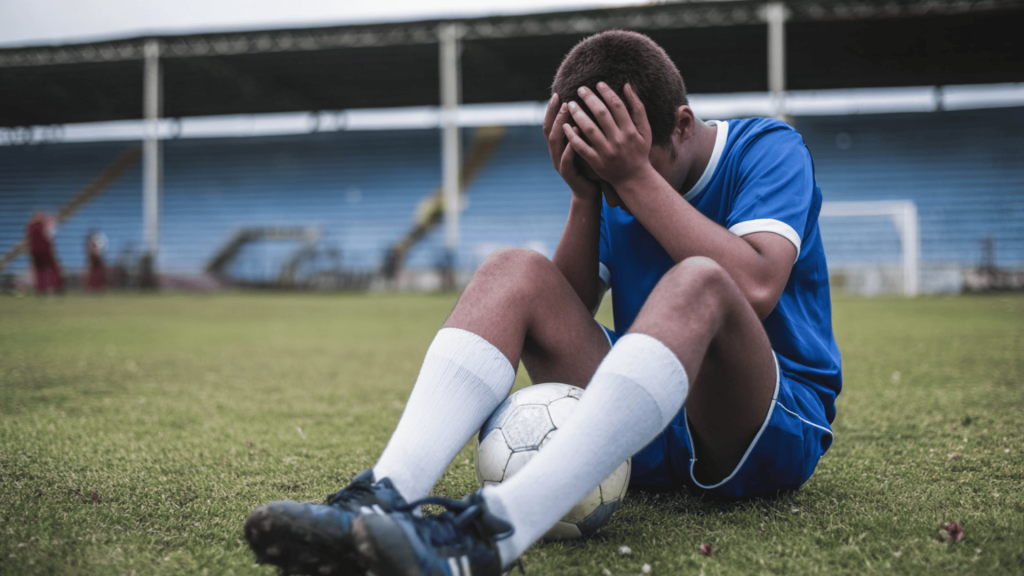The game between your ears might be more important than the one on the field.
Every soccer player knows the frustration of a perfectly healthy body failing to deliver when the mind isn’t ready. While hours are spent perfecting touches, passes, and shots, the mental game often gets overlooked.
Yet champions like Ronaldo and Messi didn’t reach greatness through physical prowess alone – they mastered the psychology of peak performance.
Mental strength separates good players from great ones, determining who crumbles under pressure and who thrives when the stakes are highest.
Your mindset shapes every decision, reaction, and outcome on the pitch. Master your mental game, and you’ll master soccer itself.
Why the Mental Side of Soccer Matters
The mental side of soccer refers to how your thoughts, feelings, and mindset impact your game.
It includes staying confident when you miss a shot, focusing when the fans are loud, and bouncing back after a loss. Mental strength matters for every player – from beginners to pros.
When your mind is strong, you make better decisions, remain calm under pressure, and persevere even when things get tough.
Players with good mental skills often beat more talented players because they think clearly and never give up. Your body might be ready to play, but if your mind isn’t prepared, you won’t perform your best.
Key Psychological Skills for Soccer Players

Every soccer player needs mental skills just like they need physical skills. These mind skills help you play better and enjoy the game more.
Key Mental Skills Every Player Needs:
- Confidence – Believing you can make plays and help your team.
- Focus – Staying sharp and paying attention during the whole game.
- Resilience – Getting back up after mistakes or losses happen.
- Composure – Maintaining a calm demeanor when the game becomes intense.
- Self-Talk – Using positive words in your head during play.
These mental skills work together like teammates. When you have confidence, it’s easier to focus. When you stay composed, you recover more quickly from mistakes.
Common Mental Challenges Players Face
Soccer players often face mental pressure that can negatively impact their performance. Recognizing these challenges enables you to prepare more effectively.
- Performance Anxiety – Getting nervous or scared before big games, experiencing butterflies, sweaty palms, and racing thoughts.
- Fear of Mistakes – Worrying too much about messing up plays, hesitating during crucial moments, and playing defensively.
- Outside Pressure – Feeling stressed from coaches, parents, or fans, constantly seeking approval, fearing disappointment.
- Loss of Focus – Getting distracted during important moments, thinking about sideline conversations, losing concentration.
- Negative Self-Talk – Being too hard on yourself after mistakes, creating internal criticism, and damaging self-confidence.
Remember, even professional players face these same mental challenges. The difference is they’ve learned how to handle them better.
Proven Strategies to Improve the Mental Side of Soccer
Learning mental skills takes practice, just like learning to kick or dribble. Here are proven ways to train your soccer mindset.
| Mental Strategy | How to Do It | When to Use It |
|---|---|---|
| Visualization | Picture yourself making great plays in your mind | Before games and practice |
| Positive Self-Talk | Say encouraging things to yourself like “I can do this.” | During games and training |
| Goal Setting | Make small, specific goals you can achieve | Weekly and monthly |
| Deep Breathing | Take slow, deep breaths to stay calm | Before games and at halftime |
| Pre-Game Routine | Do the same things before every game | 30 minutes before kickoff |
These strategies are most effective when practiced regularly. Start with one or two that feel right for you, then add more as you get comfortable.
Note: Mental training takes time, so be patient with yourself as you learn these new skills.
Role of Coaches in Developing Mental Strength
Coaches play a huge role in building strong soccer minds. Good coaches help players believe in themselves and stay positive during tough times.
They teach players to focus on trying their best instead of worrying about winning or losing.
When coaches remain calm and supportive, players feel more confident in taking risks and learning from mistakes. The best coaches remind players that errors are normal and help them bounce back quickly.
They create team environments where players support each other and celebrate effort, not just results. Smart coaches also teach mental skills during practice, not just physical ones.
Real-Life Examples of Mental Strength in Soccer
Champions Who Won with Their Minds
Soccer legends show us how powerful the mental game can be:
Cristiano Ronaldo never gives up, even when his team is losing. He uses positive self-talk and believes he can score until the final whistle.
Megan Rapinoe stays calm during penalty kicks in World Cup finals. She uses deep breathing and visualization to manage stress and pressure.
Lionel Messi bounces back from mistakes quickly during games. He focuses on the next play instead of dwelling on errors.
These players aren’t just physically gifted – they’ve trained their minds to stay strong when games get tough.
Quick Checklist: How to Train the Mind for Soccer
Building mental strength is similar to building muscle – it requires regular practice. Use this checklist to develop your soccer mindset every day.
Daily Mental Training Checklist:
- Visualize successful plays for 5 minutes
- Set one small goal for practice or games
- Practice positive self-talk during training
- Use deep breathing when feeling pressure
- Focus on effort and improvement, not perfection
- Learn from mistakes instead of getting upset
- Celebrate small wins and progress
Role of Parents in Supporting the Mental Side of Soccer
Parents have special power to help their soccer kids develop mental toughness.
The best soccer parents cheer for effort and improvement, not just goals and wins. They stay positive after both good and bad games, helping kids learn from every experience.
When parents avoid pressuring kids, they play freely and enjoy the game. Supportive parents listen to their children’s frustrations and view mistakes as opportunities for learning.
They also model good sportsmanship by being respectful to referees, coaches, and other families. Remember, your child will copy how you handle wins, losses, and challenges.
Conclusion
Soccer is played with your feet, but it’s won with your mind. The mental side of soccer helps you stay confident, focused, and resilient when games get challenging.
By developing mental skills such as visualization, positive self-talk, and goal setting, you can better manage pressure and recover from setbacks.
Remember that coaches and parents also play important roles in developing mental strength. Even the world’s best players had to train their minds, just like they trained their bodies.
Mental toughness isn’t something you’re born with – it’s something you can learn and improve over time.
What’s your biggest mental challenge in soccer? Share your thoughts in the comments below, and let’s help each other get mentally stronger!






































